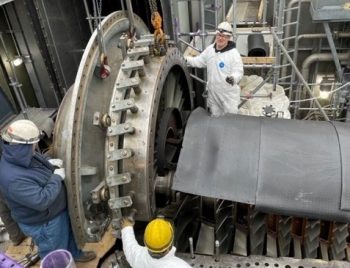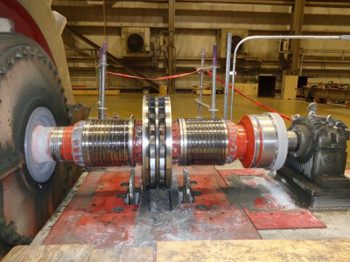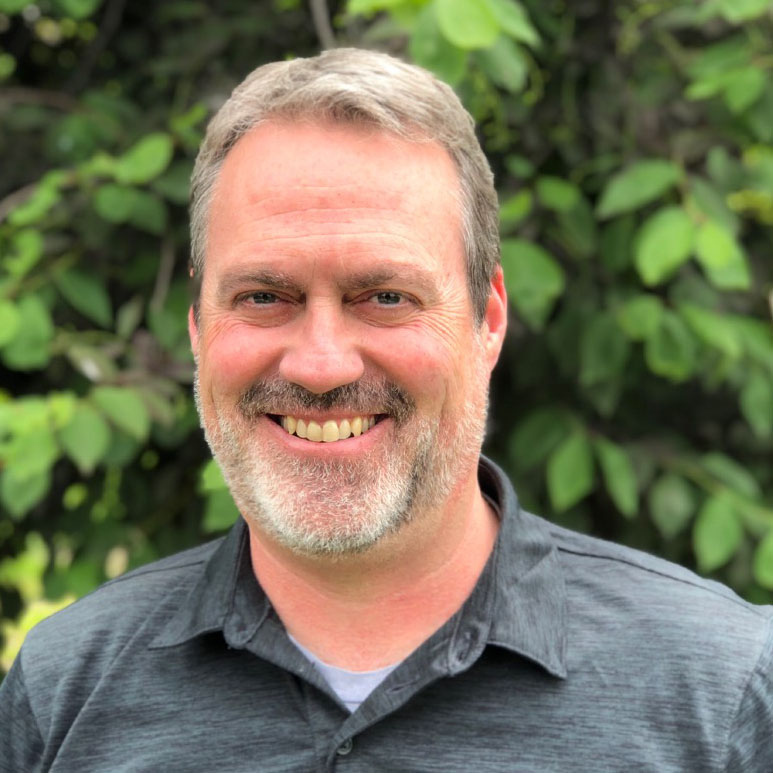Ingenuity, teamwork got unit back online

Labor Day weekend last year was pleasant and mild, with temperatures in the 80s. Summer wasn’t done with the area yet, though it was on its way out. There were still a few hot days ahead, including later in the month when temps reached triple digits.
So the timing for an unplanned maintenance outage at OPPD’s largest generating station, Nebraska City Station (NCS), was certainly not ideal. But that’s what happened after generator collector brushes on unit 2 were found chipping and breaking due to collector ring wear. The brushes help transfer current to the generator rotor.
OPPD schedules planned maintenance outages for its generating stations in the fall and spring months, when demand is lowest. Such outages help ensure the plants are ready to produce power reliably in the summer and winter months, when demand for electricity is highest.
But unplanned, or forced, outages do happen, and depending on the cause, emergency repairs may be necessary. Sometimes the fixes are quick, requiring just a day or two of repair work to bring a unit back online.
But sometimes repairs are much more involved.
Last fall, the plan was to repair the generator collector rings while the unit was offline. When a condenser tube leak also developed, OPPD personnel remained optimistic the fix would be quick.
Outage causes such as boiler tube leaks are not uncommon. Repairs can usually be made relatively quickly and without too much disruption, said Joel Johnston, director of Integrated Work Management & Planning at OPPD. Johnston has worked on outages throughout his career at the utility and has dealt with a variety of issues.
Wear and tear

But the situation changed when they learned the unit’s collector rings were much more worn than they should have been. The rings are crucial to the operation of the generator rotor.
Stationary collector brushes transfer field current to the collector rings through surface contact. The rings were found to be worn beyond the original equipment manufacturer’s minimum dimensions. That meant a more extensive repair or analysis was needed to ensure safe and reliable operation. The rings were too thin to be flattened and repaired by the repair contractor that was on site.
This wasn’t going to be a quick fix.
Critical path
When outages happen, much work is done to determine how long the repairs or maintenance work will take, thus determining the length of the outage. The time frame for a planned outage is easier to determine than the time frame for an unplanned outage, said Brian Langel, manager of System Engineering at OPPD.
The sequence of activities that determines the length of the outage is also known as the “critical path.”
“Whenever something interrupts the critical path, that costs the utility time and money,” Johnston said.
Johnston’s team helps put together the outage schedules and determine the critical path on planned outages.
“In planned outages there is a lot of effort to know whether we are still on track. Forced outages are a little harder,” Langel said. “In forced outages, the critical path is more intuition. We try to put together schedules, but in this case it was clear, this wasn’t going to be a one-day outage.”
With the collector ring wear being much worse than anticipated, the unit was taken offline on Labor Day evening.
“That’s when we said we have a real problem here,” Johnston said.
‘Issue Terminator’
The most obvious solution when equipment can’t be repaired in house is to check with the unit manufacturer, which in this case was Toshiba. But Toshiba had no replacement parts available, meaning parts would have to be made, which would take at least six months, Langel said.
The situation was getting worse.

At that point it became clear that an “Issue Terminator” was needed. An issue terminator, or lead person, is someone who can work full time to lead a team to find a solution and resolve an issue. Issue terminators are rarely needed in unplanned outages.
“Usually it is someone with the most knowledge in the area,” Johnston said.
Langel said they needed someone with three characteristics: enough technical knowledge to understand the issue and drive a solution, project management skills, and enough time to dedicate at least three weeks to the issue without distractions.
They picked Jacob Glair, Peaking Station supervisor at Standing Bear Lake Station, one of two natural gas generation balancing plants being built as part of OPPD’s Power with Purpose initiative.
“This was looking more like a long-term team, as it could take a few weeks to evaluate options,” Johnston said.
‘A unique, complex problem’
Glair had just returned from vacation when he learned about the issue.
“I’ve had experience with situations that were critical to operation, but this was a unique, complex problem,” Glair said. “I wanted to see what I could learn and what I could do to help.”
Once a team was assembled, in-depth conversations about how to handle the situation began. The stakes were high, given that the unit would be counted on in the coming winter months.
Glair “was essentially the conductor who guided the work on several different paths simultaneously,” said Langel. Some of the team were already working on the problem when Glair arrived. Others were brought on to provide support as needed, from machinists working with a vendor on the existing rings to employees from Supply Chain Management and Maintenance and various engineers.
Considering the options
OPPD called on alternate vendors after Toshiba said it couldn’t provide the replacement parts. The team worked to find spare collector rings. With Toshiba’s help, they found a generator rotor in Texas that had been removed from service and had used collector rings that might work.

Getting those rings up to Nebraska City wouldn’t be easy, as the rotors weighed about 170,000 pounds. Plus the rings would have to be removed and inspected by the manufacturer before they could be considered.
The team went to work on evaluating that option and considering how it could be implemented. Other options were to go ahead and attempt to machine the thinned collector rings, even though Toshiba advised against that.
If that was the chosen course, there would have to be assurances that doing so was safe to workers and the unit by doing a thorough technical evaluation, Langel said.
Another option was to order replacement parts to be made by the manufacturer and keep the unit offline for six months, which would be a very expensive endeavor.
The fix
The answer was to machine the existing rings and have thorough inspections and evaluations done on the repair by OPPD, an outside engineering firm, and a third party equipment manufacturer. The remachined rings were determined to be safe to use until the replacement rings from Texas could be installed during the next planned maintenance outage.
Mark Stevenson, Rigging Coordinator at OPPD, flew to Texas after getting approval for his plan to cut the ring portion of the rotor from the used generator rotor and ship just a small portion back to Nebraska City. Stevenson coordinated the logistics of the hauling company, machine cutting company and both utilities in an effort to safely move the used collector ring assembly from Texas, saving OPPD time and money.
OPPD brought the unit back online in early October, and it has been running smoothly thanks to the work done by the team. About 30 people from across the utility worked on the team, including employees from System Engineering, Design Engineering, Asset Management, Operations, Integrated Work Management, Legal, Supply Chain, Maintenance and others.
The team came together and delivered, Glair, Johnston and Langel agreed.
“The stakes were high in this case,” Langel said. “A lot of people were involved here in coming up with the solution and spent a lot of hours on this and they did great work.”

Jason Kuiper joined OPPD as a communications specialist in 2015. He is a former staff writer and reporter at the Omaha World-Herald, where he covered a wide range of topics but spent the majority of his career covering crime. He is a graduate of the University of Nebraska at Omaha and has also appeared in several true crime documentary shows. In his free time he enjoys cooking, spending time with his wife and three children, and reading crime novels.
View all posts by Jason Kuiper >


